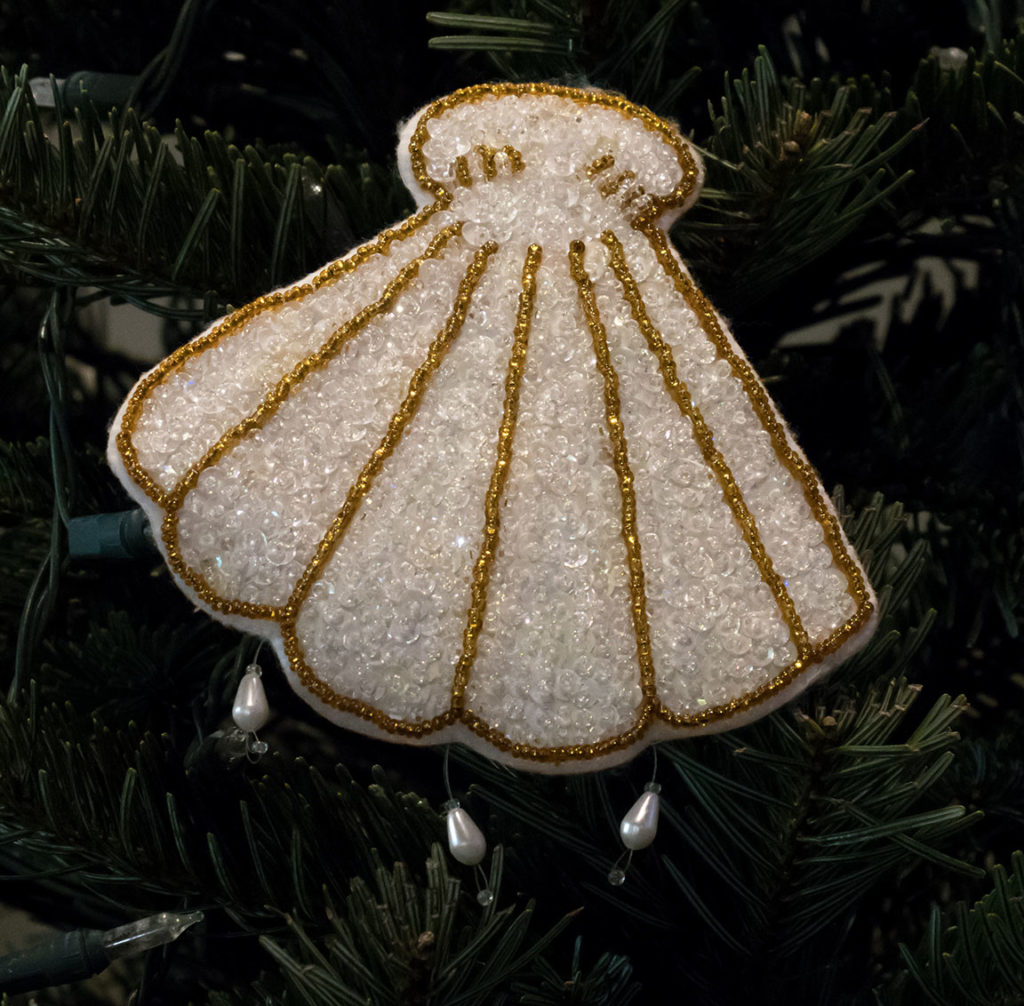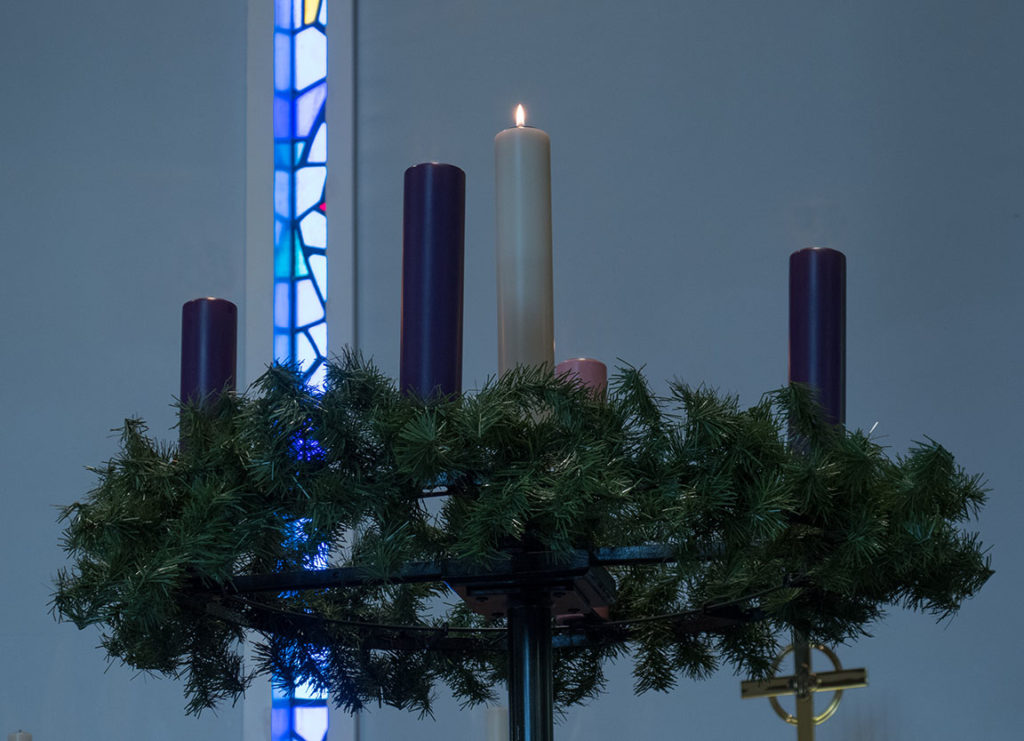Rev’d Mark B. Stirdivant, Good Shepherd Lutheran Church, Yucaipa, California
✝ sdg ✝

White Parament
For those of you who recently witnessed a baptism ceremony taking place here, you may have noticed that there is a curious little question that the ritual has the pastor ask in the preparation for the act of baptism itself. You may have gotten the impression before, “Why in the world do they do that? It doesn’t make sense.” I have at times felt a little awkward when I came to this question. I’ve looked it up and it is in fact an ancient custom in the Early Church, going back to the time when pagan Romans changed their names when they were baptized. Walther wrote about it, and he said he approves of it being included in the baptismal ceremony. What am I talking about? It goes like this:
How are you named?
Two things: in the case of an infant baptism, the parents and sponsors answer with the child’s name. For an older child or adult, they often give me a funny look and then say their name. Either way, doesn’t it seem strange that a pastor would be struck with a sudden case of amnesia at this critical point in the church service? Shouldn’t he have asked a question like that a little sooner? At least I could take the time to write it down and stick a note in my book. In my son’s case, the pastor was his own grandpa—I don’t think he would forget his name!
Why do they ask for a person’s name before he or she is to be baptized? Well, it was because of this very event in the life of our Lord and Savior Jesus that we commemorate officially tomorrow, namely, on the eighth day of Christmas. Just as there is only this one little question on page 268 in the hymnal, so the Evangelist Saint Luke only speaks of this momentous occasion in little verse 21 of his well-known chapter 2.
The circumcision requirement went back all the way to Abraham, who as we read in Genesis chapter 17 was commanded to initiate this sign of God’s covenant promise both to inhabit the Holy Land and to be multiplied into a throng of descendants that outnumbers the stars in the sky. After a Hebrew boy lived a full seven-day week under the curse of sin that was introduced to this present created world, his family would circumcise him on the eighth day to usher him into the new creation that the Lord has in store for all faithful believers. To be numbered with the countless multitude of Abraham’s children, one needed to hold on with firm belief in the promise of Christ and the new life of forgiveness and eternal salvation that He came to bring. Some sophisticated scholars to this day express their doubts that a belief in heaven could have existed as far back as Abraham’s time, but the fact that he practiced circumcision makes no mistake that he did.
Now, at eight days old, did the baby boy tell his family and comrades that he believed in the coming of Jesus or that he vowed to make of himself a true and committed Israelite? Of course he didn’t. Circumcision placed the helpless child into a covenant of grace with the Lord who created him and promised all of Israel. While it also placed upon the male a solemn reminder of sin, and the impossible Law, and the need for a Savior, the ceremony really looked forward to the time when the true circumcision would take place, which is, as St Paul says, a circumcision of heart and a putting off of the useless, encumbering flesh of the sinful nature. The fleshly, bloody symbol, which the girls were exempt from suffering, indicated the real thing, the salvation in Christ through which there would be no longer any male or female, slave or free, Jew or Gentile. All people, even though they have distinct positions and different means of serving one another, nevertheless they would participate equally in forgiveness.
You are probably already aware that Christmas loses its true meaning if there is no mention of Jesus’ crucifixion, death and resurrection. If He is just an example for you on how to live a godly and generous life, so that you become another Scrooge scared straight, then your Christ of Christmas is distorted and caricatured. There needs to be some blood to make it a true Christmas. And with sin and death all around us in this fallen world, there’s a lot of blood. But the only blood that matters is the blood of God’s only Son, the blood coursing through the arteries and veins of this eight-day old child in Bethlehem. He’s taken away for a moment from his mother, who cannot yet make her appearance in public because it’s too soon after the birth. And if the, “little Lord Jesus, no crying He makes” part of the song was actually true, well, circumcision is going to put an end to that real quick.
As you just heard, for every other Hebrew boy who was born in the Old Testament era, circumcision was an expression of hope, of a covenant promise of life that was in store in the new creation. But it was the opposite for Jesus. For this little Boy, for God in human flesh, circumcision meant that He was destined for death. This was His first shedding of blood for the salvation of Israel—and by faith in Him, you are now part of the spiritual Israel, that is, the real one. For centuries, the ritual was a rite of passage that designated the infant as separate from the unbelieving Gentiles and part of God’s holy nation. It was all part of becoming one of the family. For Jesus, His circumcision was the first step in separating Himself from the Father, who would then forsake Him at the cross and unleash wrath and judgment upon Christ as though He were the only Sinner in the whole world, and then finally in the Resurrection, the Father would welcome Him back—and you who are baptized in His Name—into the holy kingdom of heaven.
The circumcision ceremony was also the opportunity to bestow the child’s name upon him—that’s the Biblical precedent for the strange little question that we have in the baptismal ceremony. When John the Baptist was circumcised, that was a momentous occasion because instead of following the family tradition and naming their long-awaited firstborn son after Zechariah, the silenced Zechariah himself wrote on a tablet, “His name is John” and then burst forth with singing upon the fulfillment of the angel’s word. Now, roughly six months later, it’s Jesus’ turn to receive His angel-announced Name, and the scene is a little less dramatic. But the point remains nonetheless, the sweet-sounding Name of Jesus that comforts all of your fears, is a Name that cannot be separated from the Blood that He shed. The Name Jesus means, the Lord Saves, but no saving will be done without Blood. You and I were given blood to nourish our bodies and keep them alive. Jesus has blood so that He can give it up and shed that blood on the cross for you and all sinners. Sometimes, children are given names because certain expectations are placed upon the child and the role he or she is to fulfill. Jesus was given His Name so that the Israelite eighth-day hope for a new creation would finally become a reality.
Cultural anthropologists have studied rites of passage for decades, whether it’s had to do with a child being born into a tribe in Indonesia, a girl’s quinceañera in Mexico, a wedding in the United States, or a funeral in Korea. Most of these experts like to spot three distinct elements common to each ritual: a time of separation for the individual, a transition, usually occurring in the ceremony itself, and an incorporation of the individual into the community complete with their new identity and relationship.

Holy Baptism
St. Peter was inspired by the Holy Spirit to link Holy Baptism for the Christian, to what the Flood was for Noah and his family and the animals with them. First, the water and the ark separated them from the jeering unbelievers who were swept away in God’s righteous judgment. Then the time of transition was the ark floating above the mountains as Noah clung to the promise without knowing what exactly lay ahead for him and his crew. Lastly, the waters receded, the ark came to rest and the land-dwelling inhabitants of God’s creation made their new start in the world that was cleansed and renewed.
The Flood was a real event, and not some myth explaining something that is better addressed by science. Just the same, your baptism was not a mere symbol, nor a cultural rite of passage involving nothing more than human relationships. In fact, as a rite of passage, Baptism is probably the best, most real separation, transition, and incorporation that ever existed in this world! Everything else that calls itself a rite of passage either has a relationship to Baptism or it is a pale comparison to it.
Here’s what I mean: because of sin, you were separated from God, and His commandments that you have broken condemned you and all of humanity to eternal death. Without your cooperation, but solely by God’s grace in the Holy Spirit, Baptism separated you from this fallen world, washed you in water combined with God’s Word and His Triune Name, and welcomed you back to the family of the church. Your constant, daily pattern of repentance, dying and rising with Christ, and being reconciled with fellow believers with the peace of the Lord is an active remembrance of Baptism. Circumcision is not our rite of passage, it was Jesus’ transition from the poor baby lying in a manger, to the suffering Savior dying on a cross. His Name was given to separate Himself from all of us, because no other Name is given under heaven by which we must be saved, but that same Name is placed upon us in blessing and bestows upon us a new identity, as the Benediction does at the end of the church service. He has not forgotten your name; it’s recorded forever in the Lamb’s Book of Life.
So as one year is now coming to a close, and another year is beginning, we again have an opportunity to participate in the rite of passage that our Lord began for us already with His circumcision and naming on the eighth day of His walk among us in the flesh. He has truly separated you, as far as the east is from the west, from your sins, from hurts and your anxieties for the future. He has cut off the spiritual flesh of idolatry that had identified you with the fallen world, and has given you instead a circumcised heart. Your Savior has also incorporated you into His kingdom, made you an heir with Him of eternal life. By His blood you are given a new name—and all of that started from the time of your baptism. Whatever lies ahead for you in the new year, He has already been there, and He has promised you a new eighth-day creation.
The Lord Jesus who shed His blood for you, may He bless you, make His face to shine upon you, and give you peace.
In the Name of the Father and of the ✝ Son and of the Holy Spirit.

Christ-Candle is lit.